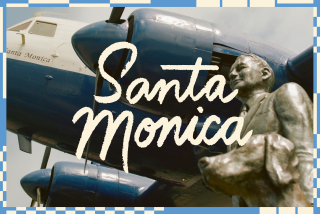1876 All Over Again : Stagecoach Inn Museum event invites visitors to hang out with frontier folk.
By day, Gordon Ting is a Westlake dentist, but when night falls on the historic Stagecoach Inn Museum this month, he’s a guitar-strumming balladeer, sort of a frontier lounge lizard, if you will.
In his vintage get-up, he sings old chestnuts, much as pioneers might have heard in 1876 had they stopped here for some supper, a little poker with the boys or just a restful night before journeying on.
For the next two weekends, anyway, it will seem that history has come alive at this Newbury Park museum, as the Conejo Valley Historical Society puts on “An Evening on the Conejo--1876.” This annual wingding, now in its eighth year, is kind of a dinner theater with the entire museum complex as the stage.
Visitors eat an old-fashioned chicken dinner while they listen to Ting’s songs of the day. Then, during a walking tour of the inn and the grounds, they eavesdrop on a series of theatrical vignettes--everything from a rowdy poker game in the saloon to haggling over land deals to a young frontier bride’s trying on her wedding gown.
It takes about 100 volunteers--including a cast of 60 amateur performers like Ting--to pull off this fund-raiser for the historical society. Performances are Friday and Saturday, and Oct. 10 and 11, with staggered dinner seating beginning at 6:30. Tickets are $40.
Like all the volunteers, even the dining-room waitresses, Ting stays in character during the evening. If anyone should ask him to sing “Happy Birthday” or some other not-yet-written song, he just feigns bewilderment.
“All the music I do has to be from 1876 or before,” said Ting, who knows his musical history. His research has turned up some surprises. He sings an 1861 ballad, “Aura Lee,” which will ring a bell: Elvis put new words to it a hundred years later and crooned “Love Me Tender.”
And take that old Kingston Trio song about some poor soul named Charlie who was lost on Boston’s transit system, immortalized as the man who never returned. It was a remake of an 1850s ballad about a ship lost at sea whose fate is still unknown.
As he sings, Ting weaves in anecdotes about the music and himself. And although he strives for historical accuracy in his music, he’s flexible.
“‘This is not like a Civil War reenactment where all the buttons have to come from that time period,” he said. “This is a facsimile--we play with it a little bit.”
The fact that Ting is Chinese, born in Hong Kong 49 years ago, might make his presence seem incongruous with the Wild West. But Ting manages to pull it off. This is his eighth year as the inn’s dinner entertainment.
His onstage character is a composite he has developed, drawing somewhat from his own family history. He tells the audience he comes from a highly educated and well-traveled family that was definitely not into the opium trade of the day. As his story tells it, he picked up his songs in his travels, which included a chance meeting with the musical Ingalls family of “Little House on the Prairie” fame.
In real life, he came to the United States in 1957 after a gutsy, 18-day sea voyage across the northern Pacific with this family. “My family sold everything they could and packed the rest in two trunks,” he said.
Early on, he was into music and cowboy stuff. “I wanted to be the rhinestone cowboy,” he said. He became a dentist instead, but along the way he was in a high school rock ‘n’ roll band and later sang with choral groups.
This year, for a change, he’ll have some musical assistance during his dining room performances. Linda Andersen, principal at Pinecrest School in Thousand Oaks, will be there with her violin, along with dulcimer player Judy Nelson.
Of the others in the cast, many are retired, including the former naval officer who plays a blacksmith and tells stories to a young boy. In the vignette with the young frontier bride, the woman assisting her is a former Radio City Music Hall Rockette. In another snippet, the aggressive sheet salesman is actually a real estate agent.
The event is a chance to peruse the museum complex and grounds. The vignettes are all in keeping with the history of the inn, originally built in 1876. In those days it was the Grand Union Hotel, a stop for the Butterfield Stage, which carried passengers through the Conejo Valley from Los Angeles to Ventura.
The hotel burned to the ground in 1970, but it was rebuilt as it originally appeared and opened again as a museum in 1976. On the grounds are other replicas: an adobe house, a Chumash hut and the pioneer home of Egbert Starr Newbury, the area’s first postmaster.
During the vignettes, visitors see the postmaster writing about the area for his newspaper column, while his wife bakes cookies. In another area, two ranchers argue over cattle versus sheep grazing. Much of it is ad-libbed.
The basement of the museum has been transformed into a Victorian dining room, where servers dressed as farm wives dole out a catered but historically accurate dinner of roast chicken, mashed potatoes, fall vegetables and a special apple walnut cake prepared by the volunteers.
BE THERE
“An Evening on the Conejo--1876” will be presented Friday and Saturday, and Oct. 10 and 11, at the Stagecoach Inn Museum, 51 S. Ventu Park Road, Newbury Park. Staggered starts for the dinner and tour begin at 6:30 p.m. Tickets are $40. For information, call the museum, 498-9441; for tickets, call 523-1123.
More to Read
Sign up for The Wild
We’ll help you find the best places to hike, bike and run, as well as the perfect silent spots for meditation and yoga.
You may occasionally receive promotional content from the Los Angeles Times.






